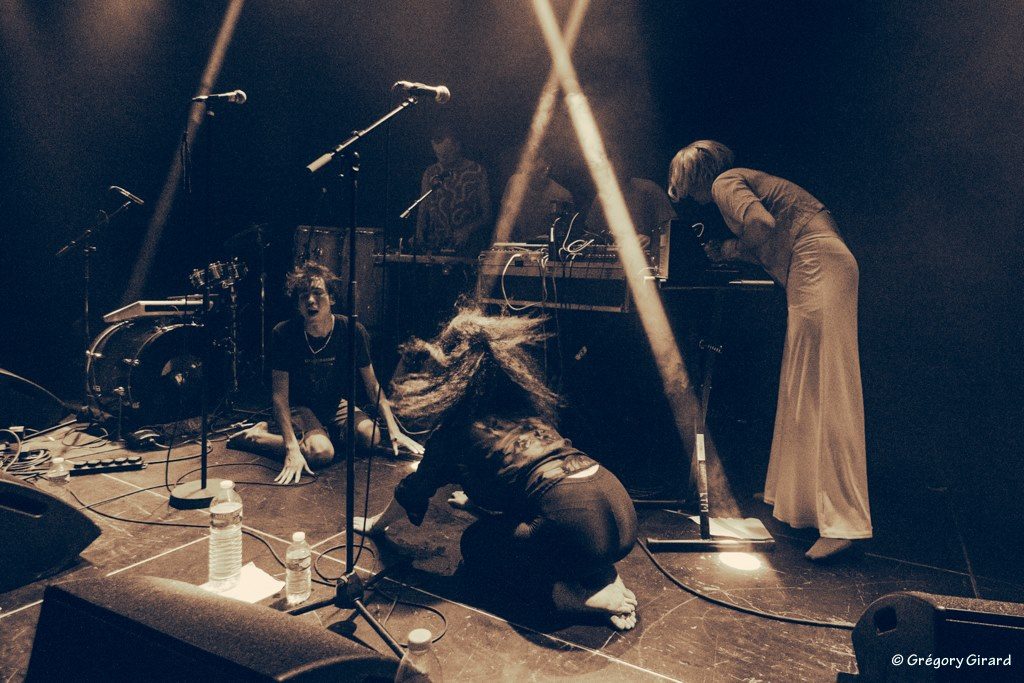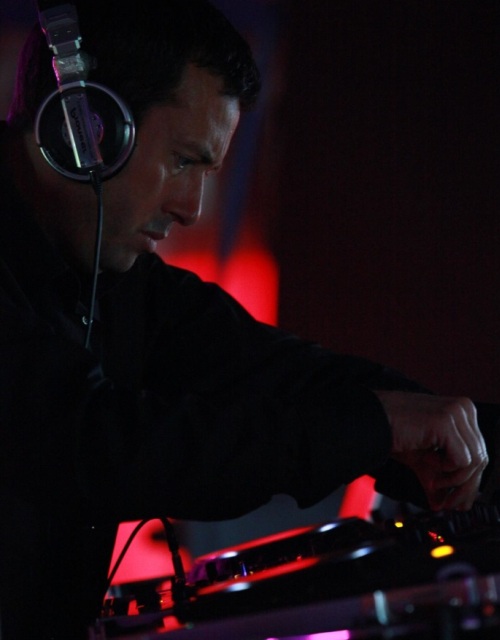For music journalists Golden Teacher is a thrilling proposition. A six-piece live band renowned for their energetic performances and love of improvisation, they feel like the product of post-disco, post-punk era New York rather than 21st century Glasgow
Last week, our good friend and contributor Matt Anniss received an email from Oliver Pitt, one sixth of lauded Glaswegian combo Golden Teacher.
It turns out that next month (November 2017), the band will finally release their hotly anticipated “official” debut album, ‘No Luscious Life’. It’s been a long time coming. Oliver was getting in touch to enquire about what had happened to the extensive feature Matt had written about the band, which originally appeared on Juno Plus (RIP) back in October 2014. Following the closure of Juno Plus this time last year, the site remained online for some time, but has now finally vanished into the ether.
Having sent Oliver the feature text, as requested, we thought it might be good to make it available again and he has very kindly allowed us to republish the feature in full.
Golden Teacher… original article (Juno Plus 2014)
For music journalists, Golden Teacher is a thrilling proposition. A six-piece live band renowned for their energetic performances and love of improvisation, they feel like the product of post-disco, post-punk era New York rather than 21st century Glasgow.
Their sound – an intoxicating, intense, often out-there mix of dense African rhythms, throbbing techno, soundsystem dub, post-punk attitude, wonky electronics and Arthur Russell style leftfield disco – is frustratingly hard to pigeonhole.
Their members include a singer who wasn’t old enough to go clubbing when the band first formed, two American electronics fetishists once famed for their entirely-improvised live performances, and a pair of brothers from York who used to record twisted no-wave. Oh, and a gangly, giggling Frenchman whose previous musical output largely consisted of intense, out-there noise-rock.
It suffices to say, there was no way I was turning down the chance to interview them. Of course, I have to find them all first. When I turn up at Powerlunches, an infamous live venue and rehearsal space nestled between a pharmacy and a kebab shop on Kingsland Road, Dalston, only one of the band is present – General Ludd member Richard McMaster (“drum machines and synthesizer”).
“Yeah, they’re not all here yet,” he says with a smile. “Ollie and Laurie are down the road in a bar, Cassie and Sam are on their way, and to be honest I have no idea where Charlie is.” He pauses. “That’s fairly normal, though.”
It’s not long before 20 year-old Cassie Ojay appears, clutching an Honest Jon’s tote bag emblazoned with a “YES” badge. Like the rest of the Glasgow-based band, she voted “yes” to independence in the recent referendum. She, too, has no idea where her fellow singer is. “Charlie does this a lot,” she says matter-of-factly. “But he always turns up to gigs. He’ll be here at some point, probably 10 minutes beforehand.”
Later tonight, Golden Teacher are set to play a sold-out secret show at the tiny London venue, whose stage is barely big enough to accommodate them. That will have to wait; for now, Juno Plus is their priority. Or at least it would be, if we could locate the rest of the band.
10 minutes later, Sam Bellacosa (“second line electronics – like second line in an orchestra”) slides into view, hobbling his way down Kingsland Road on crutches. He injured his ankle during the band’s recent tour of France. “I did it going down a water slide that had been turned off,” he says. “I got to the bottom and there was no water in the pool.” Was it a rave related accident, by any chance? “Yes,” he smiles. “It was late at night and I had been drinking.”
So far, so rock and roll – or as close to rock and roll as you can get when your output flits between strobe-friendly club jams, dubbed-out electronics and sweaty, percussive freak-outs.
Richard suggests we take a stroll down the road to join the Pitt brothers – Ollie (“first line bag of tricks”) and Laurie (“I play drums – first line percussion”) – at a backstreet bar. It’s a surprisingly warm September evening and he’s keen to sit outside.
We duly find Ollie and Laurie perched around a small table. After pinching chairs from inside the bar, the six of us sit down to discuss the Golden Teacher story so far. There’s still no Charlie, so we carry on regardless. “Charlie sleeps a lot,” Sam says. “When you see him later, you should ask him what he dreams about. I sometimes wonder.”
It makes sense to start at the beginning. With the exception of Cassie, the members of Golden Teacher were all in different bands before fate – or, more specifically, Glasgow’s Green Door Studio – brought them together. Richard and Sam had been performing shows of improvised electronics, house and techno under the Silk Cut banner. The Pitt brothers worked together as Ultimate Thrush, releasing a couple of cassettes and a single 7” of experimental no-wave, while Charles Lavenac was one half of similarly obscure outfit Blue Sabbath Black Fiji.
While some of them had previously met, it was signing up to courses at Green Door Studio that drew them together. “They facilitate courses for unemployed or young musicians, to teach you the basics of recording,” Laurie says. “You get free recording time as part of it.”
Richard takes up the story. “At Green Door, the first four months was learning the studio, then we got split up into pairs. Ollie and myself were put together, and we got three days to practise in the studio. We made a bunch of tunes that aren’t Golden Teacher, but were kind of the start of what we do now. During the recordings, we played loads of different instruments and machines, just trying them out.”
From those early musical explorations, ideas began to form. Friends and fellow students – namely Cassie, Laurie, Sam and Charles – swung by the studio and began joining in the duo’s anything-goes recording sessions. “There’s loads of people at Green Door at any one time, and loads are involved in different bands with different people. The kind of recording you do as part of the course is really informal. You can try different things and almost anyone can jam with anyone else. It works really well.”
Laurie nods in agreement. “I think what makes those sessions special is that there’s no pressure – you’re not trying to create anything that’s “a band” because you’re not really a band, you’re just jamming with your friends. That takes a lot of pressure off. I think that results in really creative music, because you’re not worrying about getting a particular track or song done. It’s just about having as much fun as possible and going really wild. That environment allowed us to do Golden Teacher in the first place – it was the freedom.”
This musical freedom and open-minded attitude seems a peculiarly Glaswegian trait – right now, at least. The city’s leftfield musical scene – pushed forward by a combination of Twitch and Wilkes’ Optimo night and the famous Glasgow School of Art – seems in rude health at present. In some ways, it mirrors the scene in New York at the turn of the ‘80s, when the likes of Konk, Talking Heads, ESG and Arthur Russell’s Dinosaur were all making waves – and impossible-to-categorize music.
“I do think there’s an atmosphere in Glasgow that’s good for creativity,” Cassie says in her broad Glaswegian accent. “I feel it comes from places like the art school where there’s a lot of creative things happening. It does bring creative people from other places to the city, and helps the music scene. The Green Door is particularly important – especially for me, as I wouldn’t have been given a chance to develop musical ideas had it not been for the Green door.”
Despite the air of creative freedom surrounding the Green Door Studio, it’s still surprising that the members of Golden Teacher hit it off during those early recording sessions. It’s even more impressive when you consider their disparate musical backgrounds, influences, musical obsessions and working methods. Really, it should have been a musical mess. That all three of their EPs have their roots in these early Green Door sessions – and genuine, on-the-spot improvisations with few overdubs – is particularly remarkable.
I make this exact point, trying to get a greater grasp of the process that results in such invigorating, otherworldly music.
“Sometimes it works, sometimes it doesn’t,” Richard says. “That’s the truth. We’ve made a bunch of bad tunes.”
“For every track we’ve released, I think there are four more that are terrible,” Ollie muses.
“I’d say it was more one to one,” Sam chips in.
“Maybe it’s one to one,” Ollie agrees. “The bad ones are unbelievably terrible, though. It’s not just ‘not quite as good Golden Teacher’, it’s like awful fusion dubstep.” All five burst into laughter.
“The process works – it’s different, but it works,” Sam argues.
“We never really make a plan with all six of us to make a particular song,” Laurie says. “Maybe half the band will be there and start to make something, and then the others will make contributions later. It might take a certain direction, then change into something else as we try and make it into a record. The finished tracks can turn out really different to the starting point.”
However they work, the results – at least those released on their three 12” singles to date – are particularly impressive. Each record seems to fizz with ideas, from the Konk style post-punk disco of “Party People” and the dubwise pulse of “Like a Hawk”, to the throbbing, DFA-on-steroids groove of “Dante & Pilgrim” and afro-psychedelic oddness of “In Stoney Sleep”.
Amazingly, their first 12”, Bells From The Deep End, sprung from those first few days of recording. “There we totally different people in there on each day,” Ollie recalls. “I don’t think any of us can remember who did what on each track. I can’t really remember who did what on what track.”
Their early sessions certainly impressed Green Door co-founders Emily McLaren and Stuart Evans. They passed on the recordings to Keith McIvor – better known as JD Twitch – who offered to release them on Optimo Music. “When Twitch said he wanted to release the music we’d made I went back and listened to the recordings,” Ollie continues. “They sounded way better than I remembered.”
The next stumbling block was thinking of a name for the project. “Seriously, we initially had no idea,” Richard says. “Emily reminded me last night that she remembers us discussing about 100 different band names.”
“None of them were any good,” Sam interjects.
“Remember ‘Muscular Disco Truck’?” Ollie grimaces. Sam nods solemnly.
After settling on the Golden Teacher moniker, they set about learning how to play their improvised tracks live. Without ever really deciding to form a band, they’d become one by default.
“Keith [Twitch] asked us to play at the Sub Club on a particular date, so that really forced us to become a band,” Richard remembers. “We had absolutely no idea what we were doing at the time. Most people decide to form a band, write songs, play gigs and then record music. We did it the other way round. It was a studio project that’s turned into an entity that can travel and be a band playing gigs at club nights.”
In many ways, it’s Golden Teacher’s live performances that have brought them wider acclaim. While their records are certainly special – amongst the most interesting, intriguing and downright different of recent years – it’s their live shows that are drawing crowds at clubs, festivals and gig venues in the UK and beyond. I’ve yet to get my first taste of their particular brand of intense, party-rocking cross-genre fusion – that will come a little later tonight at Powerlunches – but I’ve only heard good things.
“We were chatting to this sound guy in Leeds once, and he said ‘I’ve seen so many bands trying to be one thing – you guys are all trying to be in different bands’,” Richard says, causing the other four to burst into laughter again. “He said we’re interesting to watch, because we’re never the band each of us wants to be.”
They’re renowned for the improvisational aspect to their shows, with familiar tracks being moulded into new shapes via impromptu extensions, new arrangements, use of additional percussion and dub style dropping of instruments in and out of the mix. Having not witnessed this myself, I’m keen to know how it works.
“We’re making music for an hour, we have to have some direction otherwise it doesn’t really…go,” Richard stutters. “Mostly, the drum machines do it for you. It’s weird to get this kind of mesh of live playing and machines.”
Sam jumps in. “But we all try to play like we’re machines.”
“Some of us do, some of us don’t,” Richard retorts.
“Laurie is a great example of this,” Sam says, cheekily.
“I’m not a fucking machine,” Laurie responds, quick as a flash.
“I know you’re not,” Sam assures him. “That’s what makes it so great.”
“One of our friends described our performances as being like lepers dancing with robots,” Richard says.
“I think she meant leopards,” Sam laughs. “I mean, are Cassie and Charlie each going to lose a foot on stage? Is the leopard aware of the robot? Is the robot aware of the leopard? I don’t know.”
The group falls silent for a moment, before Richard begins to muse on the possibilities and pitfalls of improvisation. “The thing about improvising is that everything could just fall apart, but that makes it exciting. Playing with that idea between us adds to the excitement. It might fall apart any minute… sometimes it does. Laurie’s fallen off his drum stool before, all the power to the synthesizers has gone off, all these things.” Ollie nods in agreement. “When things break, they always break in really amazing ways. They rarely just stop.”
“It’s the combination of us playing instruments and machines that play themselves that gives this amazing space for things to go wrong in a spectacular way,” Laurie says. “If we want to go from one song to the next, we nod to make the change. Then if Ollie presses the key to start the arpeggio and it’s a totally different note, we’ll all be like ‘this sounds a bit more garage’ so we’ll just end up doing some garage rework of the song.”
There’s more knowing laughter. “The improvisational aspect makes it way more fun for us,” Laurie continues. “If it’s more fun for us, it will be way more fun for the audience. I understand now why so many bands look really bored when they’re on stage, because they’ve worked out the best way to play a song and they’re just doing it over and over again.”
Sam looks particularly animated. “Some people go to shows because maybe the band will play songs they know slightly differently. You know, like U2 doing “Where The Streets Have No Name” with a fucking Benedictine monk chorale. That would be pretty sweet, actually.”
Fun seems an important part of the Golden Teacher approach. They’re getting a reputation – partly self-promoted, given their quotes in previous interviews about the joys of audiences getting naked – as a “party band”. Many of their gigs are in clubs, rather than a traditional concert setting, and their ambition seems purely to make people dance.
“We have motivations outside of music,” Sam jokes. “One of them is eating a lot. When we were on tour in France, the catering manager of one of the venues told us that she’d heard on the grapevine that we liked to eat a lot of food and drink all the stuff in the green room.”
Again, there’s much laughter. “We’re the band that eats the most,” Cassie joins in.
“Maybe that’s the ultimate aim of the band – to get gigs so we can go more places and eat great food,” Sam says.
“I can’t decide if that’s really indulgent,” Richard says, quizzically.
“It’s deeply indulgent,” Sam answers.
Laurie shakes his head. “That’s not my motivation”
“It’s just what ends up happening,” Richard says.
“It’s second line motivation,” Laurie jokes.
“Remember when we missed sound check to go swimming in the ocean?” Sam reminisces, resulting in much laughter. “The way the industry wants to function is so different to what ideally could be a party.”
Richard nods in agreement. “The music is such a tiny part of it,” he says. “We play for 45 minutes to an hour, and that’s such a small part of your day when you’re on tour. You end up becoming this stereotype of a party band, where we just come together to have a good time.”
Fast forward a few hours, and its clear Golden Teacher are having a good time. Cramped onto the tiny stage at Powerlunches, they have the full-to-bursting basement space going crazy. Laurie batters away at the drums like a man possessed, before switching to a pair of congas. Ollie variously plays cowbell, congas, delay pedals and synthesizer. Richard, stuck at the back of the stage behind a bank of drum machines, controls the metronomic pulse underpinning the performance. Sam plays synthesizer, providing ragged arpeggios, occasional melodies and twisted electronic noises.
Out front, Cassie and Charles – who, predictably, turned up at the last minute – dance and sing, seemingly orchestrating the audience. Charles, in particular, is particularly animated. At times, it seems like the music is coursing through his body, as if he’s at one with the groove. As a punter, it’s impossible not to dance. At times, the density and intensity of the rhythms is hypnotic; despite being stone cold sober, I feel like I’m rushing. It’s an astonishing performance – one of the most memorable and invigorating I’ve seen for some time.
Once the crowd has slowly snaked its way out of the basement, sweat dripping from the walls and ceiling, I wait to chat to the band. They all look exhausted. I corner Charlie for a word, trying to explain that he missed the interview. He giggles and looks a little confused, but seems genuinely pleased I had a good time.
I decide to ask one final question before scuttling off into the night. Are you going to record an album any time soon?
Ollie shakes his head. “People in the press are always asking about when we’ll do an album,” he moans. “I don’t get this idea of the album being this defining thing. We might do an album at some point if we happen to record two EPs at the same time. Or maybe we’ll do something ridiculously weird.”
“Maybe we’ll do something unexpected,” Laurie says.
“We were talking about doing an opera,” Richard jokes.
“Well, it worked for Jerry Springer,” Sam says.





